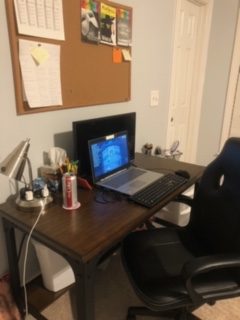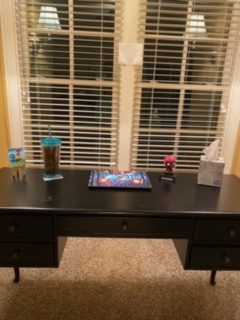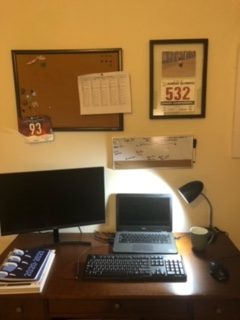A “New” World: Discovering Distractions in the Home Environment

Julia Van Aken’s school set up for virtual school.
October 23, 2020
Your phone buzzes as you try to focus on your biology lecture. You fight the urge to scroll through TikTok while your teacher talks.
Surely you can watch funny videos and listen to the notes at the same time, right?
Going to class virtually has greatly changed the school experience. Many students find that being in the comfort of their home provides an obstacle to overcoming distractions.
One issue that students are juggling is the unfortunate reality of distractions and how to handle them.
For senior Arden Lewis, her biggest temptation is losing focus in class and working on assignments from other classes.

“When given freedom, you really do have to think about how you’re going to use it,” she said.
To concentrate, Lewis said she switches back and forth between a computer and pencil and paper and keeps a clean workspace with “snacks and something to drink.”
Another tactic of Lewis’s was an idea of her dual enrollment English teacher, Georgia Googer. Googer suggested her students doodle during class to minimize the opportunity for other distractions to arise, which Lewis has found to be a beneficial idea.
For junior Julia Van Aken, though, the real problem has been her phone. When class gets boring, she often goes on her device.
Van Aken said she didn’t expect how many other people would also be distracted by their phones, based on the number of messages she gets throughout the day.
Bad migraines from looking at her screen for too long have also been a problem for her.
“After a while, I can’t look at my screen anymore, so it’s hard to pay attention sometimes,” she said.
Van Aken is taking some of her classes online and she said that she thought if she did all six or seven live with a teacher, it would be much harder to stay focused.
She has dealt with distractions by turning notifications off on her phone and wearing noise canceling headphones to combat the commotion created by her large family. She also concentrates on sticking to her time management goals, including setting specific times to do her work and sticking to those time frames.
Sophomore Christopher Jones’ can identify with the distractions a phone can cause.
“At school, I would never be on my phone during class. At home, I could be,” he said.
Jones maintains a learning environment by putting his phone on silent or in a place he couldn’t reach, working at a desk rather than in bed, keeping water near him and learning the schedule so he knows when good times are to take breaks.
He also avoids technology in between classes, like walking around instead of going on his phone.
What surprised Jones about learning from home was “how addicted I am to my phone and just how much time that can really take away from your learning,” he said.
Freshman Drew Ghent has found some of his most prominent distractions to be the freedom to do whatever he wants, constant screen time, and his phone.

After staring at a screen all day, by sixth or seventh period, his mind starts to wander. He starts to think about the other things he could be doing, and he has missed a part of class realizing it.
Ghent said that for the most part he has always enjoyed school, but because of virtual school, his attitude has shifted.
“I’ve never had that thought of, ‘Ugh I’m stuck here. I could be doing this but now that I’m home. I’ve been feeling that a lot more,’” he said.
One strategy Ghent uses to stay focused on his schoolwork is keeping technology away from him and getting dressed.
“By getting dressed in what I would wear to school, I’m in more a school mindset and it feels a lot more normal,” he said.
Having a neat, organized space dedicated specifically to school and having everything he needs with him also helps him concentrate.
“If I didn’t have a pencil or something and had to get up and get it, I think that could lead to a lot of other distractions in my house,” Ghent said.
In the end, though, Ghent is looking on the bright side amid virtual school.
“It’s going to start to feel a lot more normal in the next couple weeks,” he said, “Teachers and students will figure things out, figure out how to interact with each other.”
“We can look back on it and say, ‘This wasn’t as bad an experience as we thought it would be. This actually worked.’”
